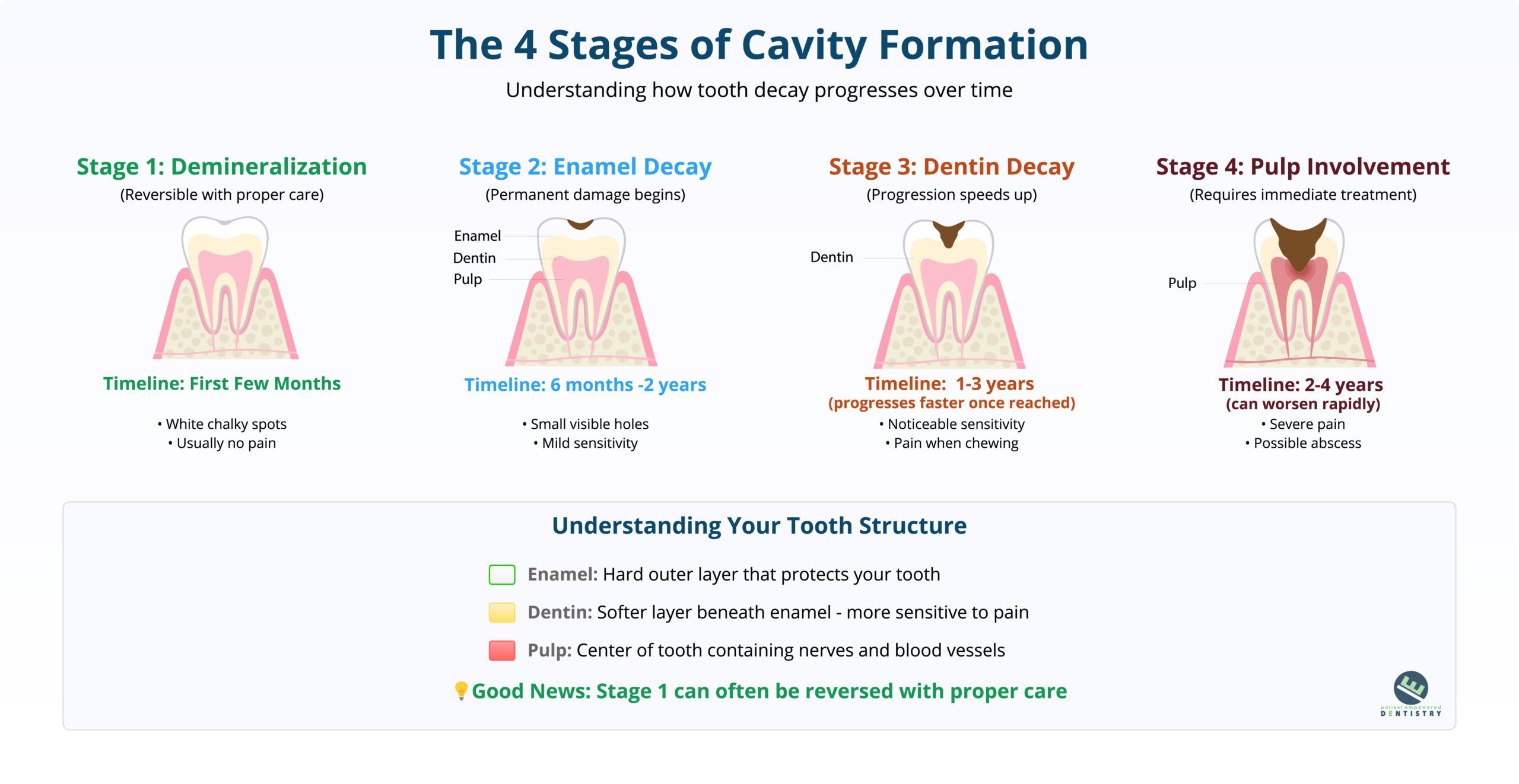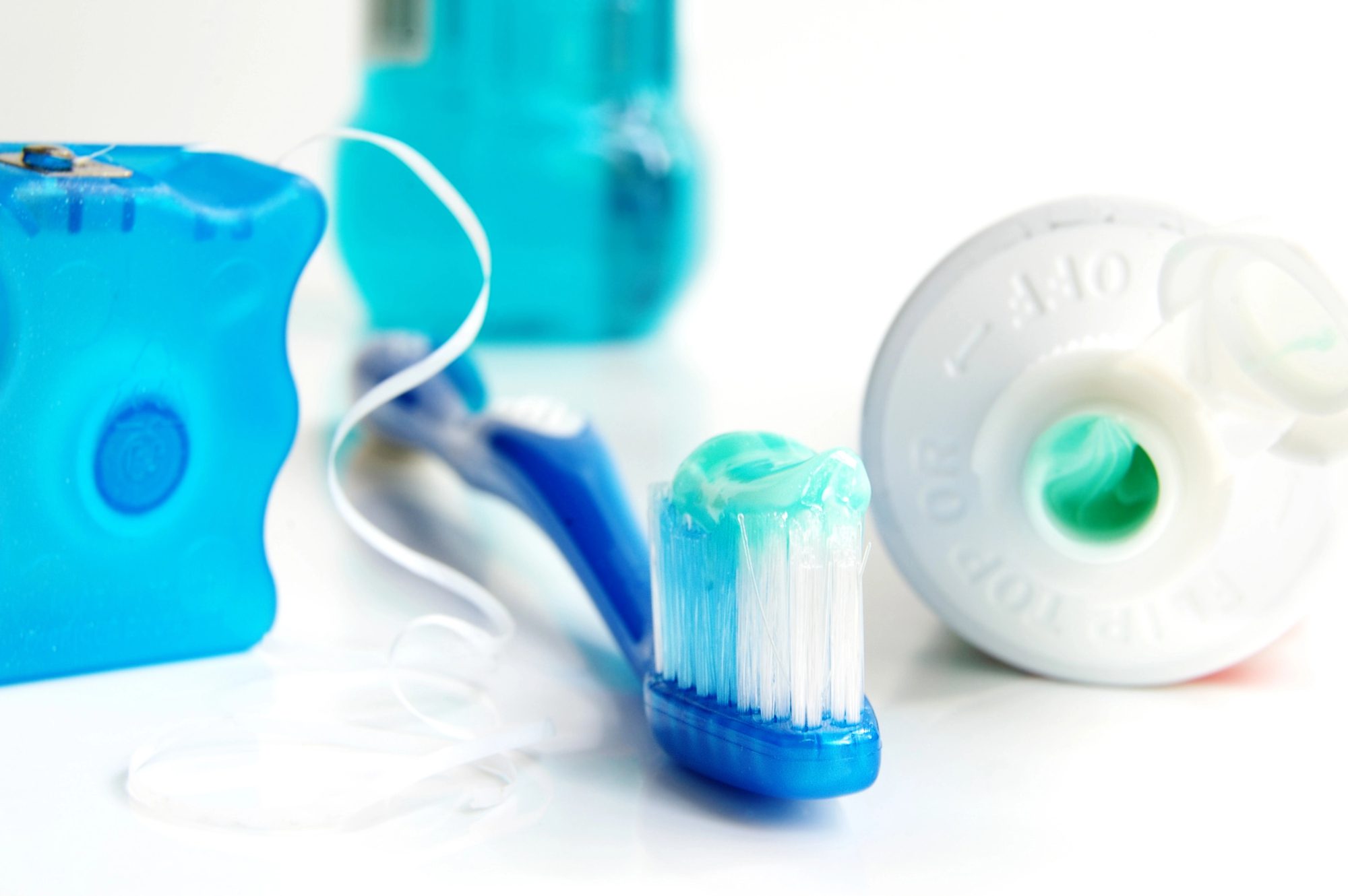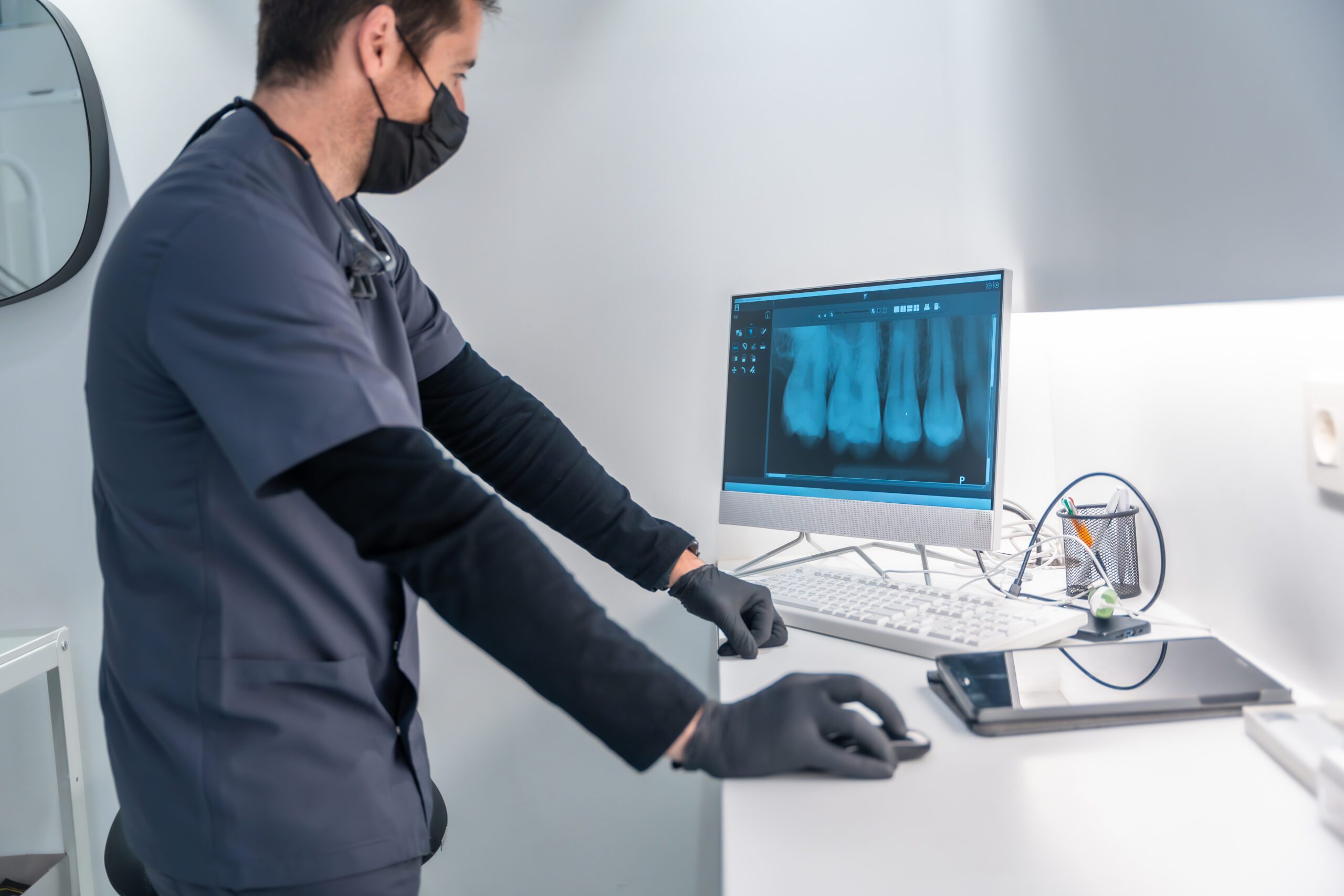Have you ever woken up with sudden tooth pain and wondered if you developed a cavity while you slept? It’s a question we hear often at our Eastpointe office, and it’s completely understandable – that sharp twinge can feel like it came out of nowhere. Let’s explore what’s really happening when tooth pain strikes suddenly and put those worries to rest.
The Short Answer – Not Quite
Here’s the reality: a complete cavity doesn’t form overnight. Cavity formation is a gradual process that typically takes anywhere from six months to several years, depending on various factors like your oral hygiene, diet, and individual tooth structure. However, the symptoms you’re experiencing can definitely seem to appear suddenly, which creates that “overnight cavity” feeling.
What’s actually happening is that tooth decay has been progressing slowly beneath the surface, and you’re finally noticing it when the damage reaches a point where your tooth becomes sensitive or painful.

How Cavities Actually Develop
Cavities are caused by bacteria in your mouth that stick to your teeth and produce acid when you eat or drink. This process happens in several stages:
Stage 1: Demineralization
The earliest phase begins when tooth enamel loses minerals due to acid exposure from plaque bacteria. You might notice chalky white spots on your teeth during this stage. The good news? This damage can often be reversed with improved oral hygiene and fluoride treatments.
Stage 2: Enamel Breakdown
If demineralization continues, the enamel weakens and tiny holes begin to form. At this point, the damage becomes permanent and requires professional treatment.
Stage 3: Dentin Decay
Once decay penetrates the enamel and reaches the softer dentin layer underneath, progression speeds up significantly. This is when you’ll likely start experiencing sensitivity to hot, cold, or sweet foods.
Stage 4: Pulp Involvement
If left untreated, bacteria eventually reach the tooth’s pulp (the center containing nerves and blood vessels). This stage typically brings severe pain and may require root canal treatment.
Why Tooth Pain Can Feel Sudden
Even though cavity formation takes time, several factors can make dental pain seem to appear overnight:
Pain Threshold Breakthrough
Tooth decay may have been progressing silently for months. When it finally reaches the nerve-rich dentin or pulp, you suddenly become aware of the problem through sharp, unmistakable pain.
Temperature Sensitivity
A change in what you eat or drink – particularly very hot or cold items – can suddenly highlight existing weak spots in your enamel that weren’t bothering you before.
Existing Dental Work Failure
Sometimes what feels like a new cavity is actually an old filling that’s cracked or fallen out, suddenly exposing the sensitive tooth structure underneath.
Stress and Grinding
Increased stress can lead to teeth grinding, which puts additional pressure on already weakened teeth and can trigger sudden pain.

Early Warning Signs to Watch For
Being aware of early cavity symptoms helps you address problems before they become painful emergencies:
- White or brown spots on tooth surfaces that don’t brush away
- Increased sensitivity to sweet, hot, or cold foods and drinks
- Rough texture when you run your tongue over a tooth
- Mild discomfort when biting down
- Food getting stuck in the same spot repeatedly
What Speeds Up Cavity Formation
Understanding these risk factors can help you take control of your oral health:
Diet and Eating Habits
Frequent consumption of sugary or starchy foods feeds bacteria in your mouth, leading to increased acid production. Sipping sodas or snacking throughout the day gives bacteria constant fuel to attack your teeth.
Poor Oral Hygiene
Inconsistent brushing and flossing allows plaque buildup, creating an acidic environment that accelerates enamel breakdown.
Dry Mouth
Saliva helps neutralize acids and wash away food particles. Medications, medical conditions, or dehydration that reduce saliva flow increase cavity risk.
Genetics and Age
Some people naturally have softer enamel or different mouth bacteria, making them more susceptible to decay. As we age, gums may recede, exposing tooth roots that are more vulnerable to cavities.

Prevention Strategies That Actually Work
The best defense against cavities involves consistent daily habits:
Master Your Oral Care Routine
Brush twice daily with fluoride toothpaste and clean between your teeth daily with floss or interdental brushes. This removes the plaque bacteria that cause decay.
Choose Tooth-Friendly Foods
Focus on calcium-rich foods like cheese and yogurt, crunchy fruits and vegetables that stimulate saliva production, and limit sugary snacks and drinks.
Stay Hydrated
Drinking plenty of water, especially fluoridated water, helps maintain healthy saliva flow and rinses away food particles.
Don’t Skip Professional Care
Regular dental cleanings and checkups allow us to catch problems early and provide preventive treatments like fluoride applications or sealants.
Can Early Decay Be Reversed?
This is where timing becomes crucial:
✅ Yes – In the Very Early Stages
During initial demineralization, improved oral hygiene and fluoride treatments can help enamel repair itself. Your teeth can actually regain lost minerals if you catch the process early enough.
🚫 No – Once a Hole Forms
Once bacteria have created an actual cavity in the enamel, professional treatment becomes necessary. However, modern fillings are comfortable, durable, and can restore your tooth’s function completely.
When to Seek Professional Help
Don’t wait for severe pain to develop. Contact our office if you experience:
- Any persistent tooth sensitivity or discomfort
- Visible spots or holes in your teeth
- Food consistently getting trapped in the same area
- Bad breath that doesn’t improve with proper oral hygiene
- Any concern about your oral health
Remember, early treatment is always less invasive and more affordable than waiting until a problem becomes an emergency.
Taking Control of Your Oral Health
While cavities don’t truly form overnight, understanding how tooth decay progresses empowers you to take action before problems become painful. The key is consistency in your daily oral care routine and staying proactive about professional dental care.
At Patient Empowered Dentistry, we believe knowledge is power when it comes to your oral health. We’re here to help you understand what’s happening in your mouth and work with you to prevent problems before they start.
If you’re experiencing tooth pain or have concerns about cavity prevention, contact our Eastpointe office today. Together, we can develop a personalized plan to keep your smile healthy and pain-free for years to come.
